Luke Stone 03 - Situation Room Read online
Page 4
She was in prison? It couldn’t be real.
“Trudy Wellington is facing the death penalty?” he said.
“In a word, yes.”
“Basically, because she didn’t turn Don in?”
Susan shook her head. “It’s treason, no matter how you want to spin it. A lot of people died, including Thomas Hayes, who was both the President of the United States and a personal friend of mine. Wellington could possibly have prevented it, and chose not to. She chose to not even try. About the only way she can save herself at this point is to testify against the conspirators.”
“I have trouble believing that she knew,” Luke said. “Has she confessed?”
“She denies everything,” Kat Lopez said.
“I would tend to believe her,” Luke said.
Kat held out her tablet. “There’s about two hundred pages of evidence. We have access to most of it, which you can review. You might feel differently after you do.”
Luke shook his head. He looked at Susan. “So where does this leave us?”
She shrugged. “You can have Mark Swann and Ed Newsam for a couple days if you feel you need them. But you can’t have Trudy Wellington.”
She looked at him.
“And your chopper leaves in under an hour.”
CHAPTER FIVE
August 16th
7:15 a.m.
Black Rock Dam, Great Smoky Mountains, North Carolina
From Luke’s window, nothing seemed out of the ordinary as their sleek black helicopter flew low over the dam. They came in over Black Rock Lake, which was long, undulating, and picturesque, bordered on all sides by dense green wilderness and steep hillsides. A narrow roadway crossed the top of the dam. They flew past it, and the dam itself fell away, fifty stories down to the power house and the floodgates. The floodgates appeared to be operating normally, a small trickle of water flowing out from beneath them. About a quarter mile of electricity transformers, a spider web of steel towers and high tension wires, stretched away from the dam. They seemed to be intact.
“Not much to see,” he said into his headset.
To his left sat big Ed Newsam, staring out the window on the opposite side. Ed’s broken hip was mended, and it looked like he had been hitting the weight room. His python-like arms were more swollen than Luke remembered, his chest and shoulders were even broader, his legs even more like oak trees. He wore jeans, work boots, and a simple blue T-shirt.
In the row behind them sat Mark Swann. He was long and lean, his blue-jeaned legs jutting out in the aisle, his checkerboard Chuck Taylor sneakers crossed at the ankles in front of Luke. His sandy hair was longer than before, tied in a ponytail now, and he had swapped out his aviator-type glasses for the round John Lennon style at some point in the past two months. He wore a black T-shirt with the logo from the punk rock band The Ramones. The NSA offices must be quite the fashion show.
“The water went out the floodgates just like it’s supposed to do,” the chopper pilot said. He was a middle-aged man wearing a black nylon jacket with the capital letters FEMA in white on the back. “There was no damage to the dam or the dam facilities, and there were no casualties among dam personnel. The only thing that happened here was the access road got washed away. About three miles south is where the real action starts.”
They had flown on a Secret Service jet from DC to a small municipal airport at the edge of the National Park. They had arrived just before sunrise, and this chopper was waiting for them. They didn’t talk much on the flight down. The mood was somber, given the circumstances, and Trudy Wellington, as the intel officer, would normally have done most of the talking. Susan had offered Luke a different intel person, but Luke declined. They were coming down to brace a prisoner anyway. He could give them all the intel they needed.
Luke sensed they were all feeling the loss of Trudy, and a certain amount of shock at her situation. He also sensed, or thought he did, that both of these guys had moved on in their lives. New assignments, new training, new team members and co-workers, new challenges to look forward to. A lot could change in two months.
The Special Response Team was gone. Luke could have chosen to save it in some form—after the coup attempt and Ebola attacks he could write his own ticket and take them all with him—but instead he chose not to. Now the SRT was old news, and so was Luke Stone. He had retired, and that was one thing. But he had also disappeared, and he hadn’t made much effort to keep in touch. Team cohesion was a big part of intelligence and special operations work. With no contact, there was no cohesion.
Which meant that right now, there was no team.
The chopper banked and headed south. Almost immediately, the devastation became clear. The entire area below the dam was flooded. Large trees were ripped out everywhere and tossed around like matchsticks. In a few minutes, they reached the site of the former Black Rock Resort. Parts of the upper floor of the main building were still intact, rising up out of the floodwaters. Cars were stacked up against the wrecked hotel, along with more trees, a few of which reached out of the water with arms to the sky, like religious converts imploring God for a miracle.
The effect of the cars and the trees and the various piles of flotsam was to build a mini-dam, behind which a wide lake had formed. About a dozen Zodiacs were parked on the lake, with teams of divers in full scuba gear either preparing to drop in, or climbing out, depending on the boat.
“They find any survivors here?” Luke said.
The pilot shook his head. “Not a one. At least that was the word as of this morning. They found about a hundred bodies in the resort cafeteria, though. They’re bringing them up one by one. I don’t think they’ve started the room to room search yet. They might even let the waters subside before they do that. Moving through corridors underwater is dangerous work, and probably unnecessary. Ain’t nobody alive down there.”
Ed Newsam, who had been sprawled out in his normal laid-back style, shifted in his seat and sat up just a touch. “How do you know that, man? Could be air pockets under that water. Could be people down there hanging on for a rescue.”
“They’ve got underwater listening equipment on those boats,” the pilot said. “If anybody’s alive under that water, they didn’t make a peep all day yesterday or last night.”
“Even so, if I’m in charge, I’ve got my best divers going room to room right now. We already know the people in the cafeteria are dead. And the divers signed on for danger. The civilians didn’t.”
The pilot shrugged. “Well, son, they’re working as fast as they can.”
The chopper moved further south. The flood had cut a swath through the valley, ripping a path across the forest. It looked like a giant had blundered his way through here. There was water everywhere. Wherever the original riverbed had been was lost under all the water.
They passed over the town of Sargent, still four feet deep in water. The devastation here was not as complete. There were a lot of empty lots where Luke assumed houses must have stood, but other houses, buildings, and fast food signs stuck up out of the water like fingers. The chopper flew over a cinderblock building with a stack of cars and SUVs piled up against it. HONEST ABE’S PRE-OWNED CARS, said a sign sticking halfway out of the water. One of its support beams had caved in.
“How many dead here?” Luke said.
“Five hundred,” the pilot said. “Give or take some spare change. Still a hundred or more missing. It was early morning, and there wasn’t much warning. A lot of people got swept away in their homes. You’re asleep in bed and the old Cold War air raid signal goes off, what do you do? Some folks apparently went downstairs to their basements. That’s nowhere to be when a flood comes.”
“No one expected the dam to break?” Swann said. It was the first thing he had said since they boarded the chopper.
The pilot was busy with his controls. “Why would they? The dam didn’t break. That dam was built to last a thousand years.”
“Okay,” Luke said. “I’ve seen enough. Let’s
go talk to the prisoner.”
*
8:30 a.m.
Chattahoochee National Forest, Georgia
The camp appeared out of the deep forest like some weird mirage.
“Pretty, it ain’t,” Ed Newsam said.
It sat in a perfect clear cut, one mile by one mile, a brown and gray square amidst all the dark green. As the chopper came closer, Luke could make out dozens of barracks, row upon row of them, and a large, square reservoir of water in the center of the camp. Outbuildings surrounded the reservoir, and a steel catwalk traversed it.
The chopper began to drop down, and Luke could see the helipad approaching. It was in an area in the far west corner of the camp, with a few large administration buildings, a swimming pool, and a couple of parking lots. He could now clearly make out concrete yards, an access road, streets inside the encampment, and a wall topped with barbed wire and guard towers around the perimeter. The place was an open wound in the midst of the surrounding forest.
“What is this place?” Luke said into his headset.
The chopper pilot was busy working his controls, but not too busy to talk. “I’ve heard it called Camp Enduring Freedom,” he said. “People around here tend to call it Camp Nowhere. It’s one of ours. Federal Emergency Management Agency. You won’t find it on any maps. I’d guess it doesn’t officially have a name.”
“Does it exist?” Luke said.
The chopper was low now, the grim gray buildings of the camp rising up all around them. Luke noticed glass reinforced by steel wires on the closest buildings.
The pilot shook his head. “Does what exist? This is uninhabited wilderness. There’s nothing out here as far as I know.”
A signalman in a yellow vest and holding bright orange wands stood to the side of the helipad and guided the chopper in. The pilot set the bird down perfectly in the middle of the pad. He killed the engine and the rotors immediately began to slow. There was a whine as they powered down.
“When you see that Chinaman,” the pilot said, “give him a couple of knocks for me.”
“We don’t do that kind of thing,” Luke said.
The pilot turned around and smiled. “Sure you don’t. Son, I fly people in and out of places like this all the time. I know who does what just by looking, believe me. One glance at you guys and I know they’ve decided to turn up the heat a few notches.”
He, Swann, and Ed exited the chopper, heads ducked low. A man was already waiting on the pad to greet them. He wore a gray business suit and a blue tie. His hair was blown about by the slowing blades of the helicopter. The fabric of his suit rippled from it. His black shoes were polished to a bright sheen. He looked as if he had just stepped off a commuter train in Manhattan. He was about as out of place as a man could possibly be.
As Luke came closer, the man’s face took form. He appeared ageless—not old, not young, some indeterminate place in between. He extended a hand. Luke shook it.
“Agent Stone? I’m Pete Winn. They told me the President sent you. Thanks for coming down to see us.”
“Thanks, Pete. Please call me Luke.”
Luke, Ed, and Swann followed Pete Winn away from the chopper and toward a corrugated aluminum hut at the far side of the pad. Even the chopper pad was surrounded by barbed wire fencing. The only way in or out of the helipad was through that building. The doors to the building were operated by a seeing-eye device. They opened automatically as the men approached.
“What is this place?” Luke said.
“This?” Winn said. “You mean the camp?”
“Yes.”
“Ah, well, I’ll give you the thirty-second elevator pitch. It’s basically a detention camp. We’ve got just over two hundred and fifty detainees at the moment, including more than seventy children. Mostly, they’re illegal aliens from Mexico and Central America whose lives would be at risk from the drug cartels or criminal gangs if they were sent back home. They haven’t been granted asylum, so they stay here with their families until such time as the Immigration and Naturalization Service can decide what to do with them. Their immigration status is officially undetermined. Meanwhile, since this place is invisible, the gangs have no idea where they are.”
They passed through the building quickly. It was basically a hangout for flight controllers, helipad signalers, and pilots. There were a few desks and chairs, some radio and video monitoring equipment, a radar screen, a coffee maker, and an old box of stale donuts on a table.
“So they sit here endlessly?” Swann said.
“Well, endlessly is a long time,” Winn said. “The family that’s spent the most time with us has been here seven years.”
Winn must have seen the looks on their faces.
“It’s not as bad as it sounds. Really. All the children go to school five days a week. The school is right here on the grounds. There are enrichment activities, including two first-run movies each weekend, shown in both English and Spanish. There’s soccer and basketball, and the adults are able to take language classes and job skills training, including training with master carpenters we bring in here.”
“Sounds great,” Swann said. “You guys mind if I spend my vacation here?”
“You might be surprised,” Winn said. “People like it here. It’s a lot better than going home and getting murdered.”
A black SUV waited for them outside the hut. As the car drove through the camp, they passed another fence topped with looping razor wire. A handful of men sat on benches on the other side of the fence. Four or five of them were white men. A couple of them were black. They all wore bright yellow jumpsuits. They stared through the fence at the passing car.
“Those guys don’t look like Mexicans,” Ed Newsam said.
Pete Winn’s face began to change. Earlier it had been friendly, maybe even a touch nervous to meet Luke and his team. Now it seemed almost dismissive.
“No, they don’t,” he said. “We’ve got some home-growns in here, too.”
“Are they hiding out from the cartels?” Swann said.
Winn stared straight ahead. “Gentlemen, I’m sure there are aspects of your work that you aren’t at liberty to discuss. The same holds true for me.”
After a few minutes they had traveled to the far side of the camp from the helipad and administration buildings. The car stopped. There was no one around—no prisoners, no workers, no one at all. A small cabin sat by itself on a desultory dirt lot.
The men stepped out. The lot was barren, hard-packed earth. Any sense of camp activity, or even life itself, was far away from here.
Pete Winn handed Luke a key ring. There was only one key on it. Winn’s face was hard now. His eyes were steely and cold. His demeanor had completed its drastic change from the uncertain functionary who had greeted them on the helicopter pad, to whatever it was now.
“The existence of this cabin is classified. Officially, it doesn’t exist, nor does this prisoner. Your visit here does not exist. The Chinese government has made no inquiries, official or backdoor, into the whereabouts of a man named Li Quiangguo. My understanding is the Chinese have acted like they have nothing to hide or to be concerned about, and have even offered assistance in finding the source of the hack into the dam operating system.”
He gestured with his head toward the cabin.
“The walls of the cabin are soundproof. The key opens an equipment cabinet in the back room. If you feel you need equipment to facilitate your interrogation, you may find what you’re looking for in that cabinet.”
Luke nodded, but didn’t say anything. He didn’t like the assumption these people all seemed to make that he had been called in here to torture the prisoner.
Had he tortured people before? He supposed he had, depending on the definition of that word. But no one had ever called him into a situation with the idea that he was going to torture a suspect. If they did, they’d be pretty foolish—there were people far more versed at it than Luke. When he had done it in the past, it was on the fly and he was improvising, a
lmost always because a subject had critical information and Luke needed that information now.
Pete Winn went on, but now his manner was more relaxed, and his words were mundane.
“If you need anything, lunch, beer, dinner, or you want the car to return you to the helipad, just pick up the telephone in the cabin and dial zero. We’ll send you what you need. We can put you up on the base for the night if you like, and provide any kind of toiletries or personal items. Soap, shampoo, shavers—we have all that stuff. We can also get you a change of clothes, within reason.”
“Thank you,” Luke said.
“I’m going to leave you to it,” Winn said. “Good luck.”
When the man was gone, Luke stopped to talk with his men outside the cabin. Green mountains towered around them outside the camp fence. The camp seemed to be built inside a bowl.
“Swann, how many years were you in China?”
“Six.”
“In what part?”
“All around. I lived in Beijing mostly, but I spent a lot of time in Shanghai and Chongqing, also a little bit in the south, in Guangzhou and Hong Kong.”
“Okay, I want you to watch this guy closely, get any indications from him that you can. Anything at all. Where you think he might be from. How old he might be. His level of education. His level of computer know-how. Is he even from China at all? Susan Hopkins’s people told me the guy is perfectly fluent in English. What are the chances he was born here in the States, or in Canada, or Hong Kong? Or anywhere at all, really. There are Chinese people everywhere.”
Swann shook his head. “If the guy’s an operative, I’m not going to know that stuff. He’ll be too good at hiding his origins.”

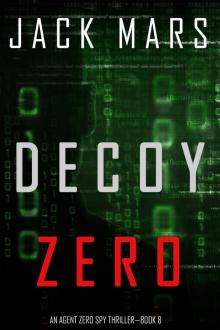 Decoy Zero
Decoy Zero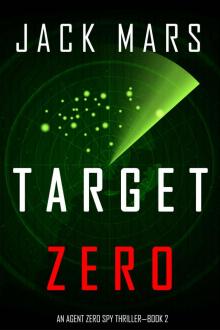 Target Zero
Target Zero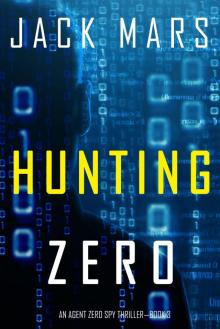 Hunting Zero
Hunting Zero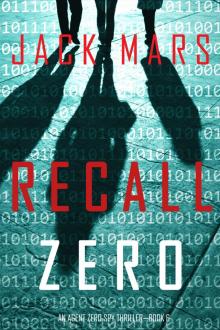 Recall Zero
Recall Zero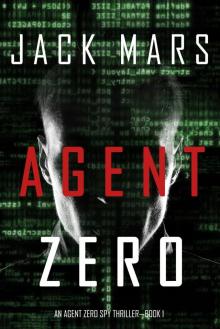 Agent Zero
Agent Zero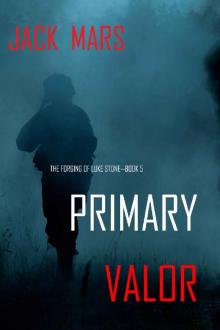 Primary Valor
Primary Valor File Zero
File Zero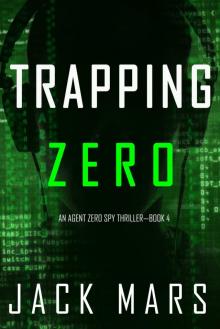 Trapping Zero
Trapping Zero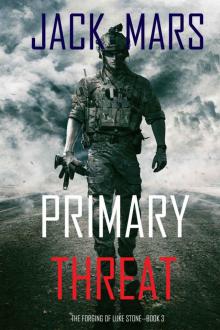 Primary Threat
Primary Threat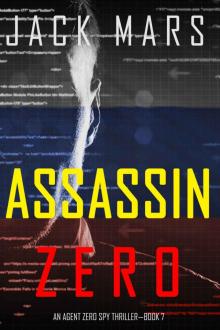 Assassin Zero
Assassin Zero Zero Zero
Zero Zero Zero Zero (An Agent Zero Spy Thriller—Book #11)
Zero Zero (An Agent Zero Spy Thriller—Book #11)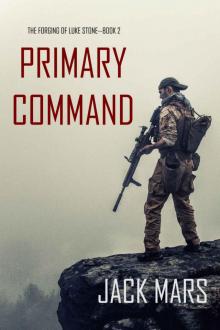 Primary Command
Primary Command![[Luke Stone 02.0] Oath of Office Read online](http://i1.bookreadfree.com/i/03/21/luke_stone_02_0_oath_of_office_preview.jpg) [Luke Stone 02.0] Oath of Office
[Luke Stone 02.0] Oath of Office House Divided
House Divided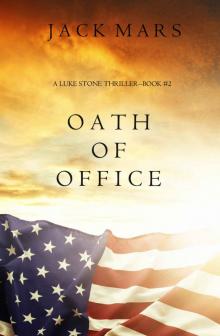 Oath of Office (a Luke Stone Thriller—Book #2)
Oath of Office (a Luke Stone Thriller—Book #2) Our Sacred Honor (A Luke Stone Thriller—Book 6)
Our Sacred Honor (A Luke Stone Thriller—Book 6)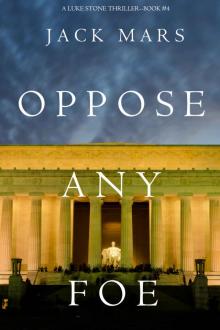 Luke Stone 04 - Oppose Any Foe
Luke Stone 04 - Oppose Any Foe Our Sacred Honor
Our Sacred Honor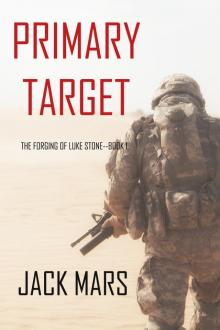 Primary Target
Primary Target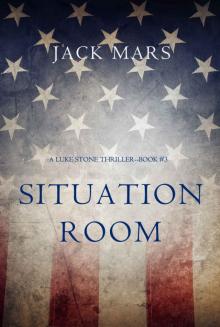 Luke Stone 03 - Situation Room
Luke Stone 03 - Situation Room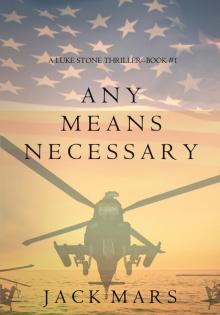 Any Means Necessary: A Luke Stone Thriller (Book 1)
Any Means Necessary: A Luke Stone Thriller (Book 1)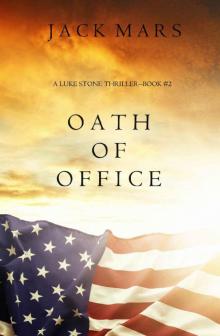 Oath of Office
Oath of Office